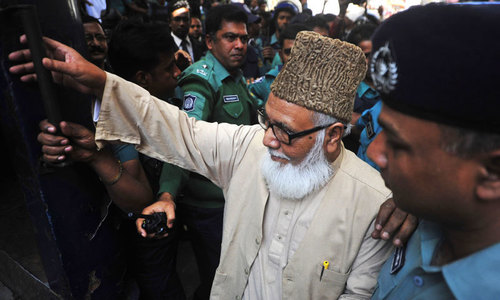Pakistan accuses Bangladesh of 'killing' opposition leaders through flawed trials

ISLAMABAD: The Foreign Office on Wednesday said it was deeply saddened over the hanging of the Jamat-i-Islami (JI) Bangladesh chief Motiur Rahman Nizami after a decision by a controversial war crimes tribunal for his involvement in 1971 events.
"The act of suppressing the opposition by killing their leaders through flawed trials is completely against the spirit of democracy," Foreign Office spokesman Nafees Zakaria said in a statement.
The statement said it is "unfortunate" for the people of Bangladesh who had elected Nizami as their representative in the parliament.
Related: Bangladesh executes top Jamaat leader Motiur Rahman over '1971 war crimes'
Zakaria added that since the beginning of such trials, several international organisations, human rights groups and international legal figures have raised objections to the court proceedings, especially regarding fairness and transparency, as well as reported harassment of lawyers and witnesses representing the accused.
He offered condolences to the bereaved family members and the followers of Nizami.
Reaction from Islamabad to the sentencing and executions in the past had evoked strong reaction from Dhaka.
The trial of people accused of ‘war crimes’ during the 1971 war has been a major irritant in the bilateral ties.
Related: Bangladesh executes 2 opposition leaders despite concerns
Five politicians, most of whom were associated with Jamaat, have so far been executed after they were convicted by the controversial war crimes tribunals set up by Hasina Wajid’s government in 2009.
Another accused died while his appeal against conviction was being heard.
Related: Human rights group urges Bangladesh to suspend executions
It is pertinent to mention here that after the rejection of Nizami’s final appeal against death sentence, Pakistan had reminded of the Tripartite Agreement of April 1974 under which Bangladesh’s founding father Mujibur Rehman had ended prosecution of the elements his government had accused of war crimes.
The accord had specifically mentioned a statement by then Bangladesh prime minister Mujibur Rehman that “he wanted the people to forget the past and to make a fresh start, stating that the people of Bangladesh knew how to forgive”.
The trials were, however, resumed when his daughter Wajid came to power in 2009.















































